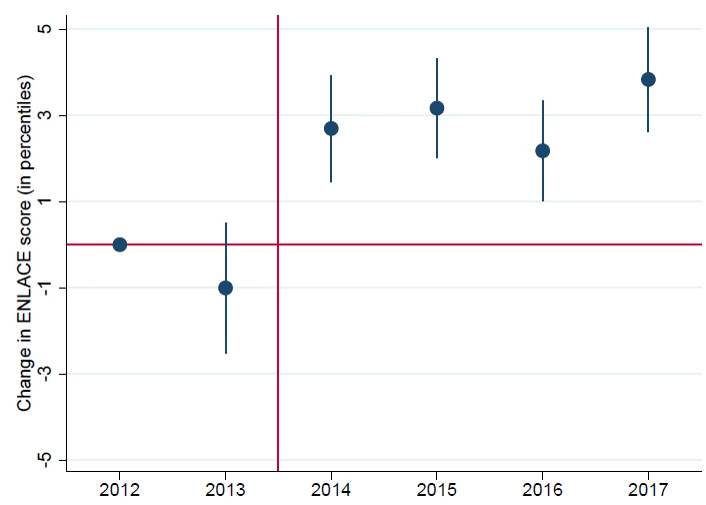 Teacher and student in classroom—Mexico. | © shutterstock.com
Teacher and student in classroom—Mexico. | © shutterstock.com
The meritocratic recruitment of public sector employees is vital to a well-functioning society. Yet research shows that many governments in low- and middle-income countries do not recruit public sector employees meritocratically. How does this impact state capacity and social well-being?
Teachers are among the most important public sector employees—critical to student learning, productivity, long-term growth, and social mobility. Furthermore, teachers account for a significant part of public sector employment and budget. Around 24 percent of public sector employees in Mexico are teachers, accounting for more than 16 percent of total public expenditure.
In a recent paper, we study the effect of civil service reform on the skills profiles of new teachers. We do so in the context of a nationwide education reform implemented in Mexico in 2014 (called the “SPD reform” for its Spanish acronym). Among other changes, the SPD reform mandated centrally managed, competitive examinations to determine hire and promotion decisions, proscribing a discretionary system in which local officials and teachers' union representatives took such decisions at the state level. The SPD reform scaled up a previous reform (2007–2012) that introduced competitive examinations for a share of total teacher hiring in response to criticisms about opacity, corruption, and absence of merit in the discretionary system. We analyze the effects of the SPD reform on newly hired teachers' cognitive skills. Teacher quality is multidimensional, but several papers have shown that teachers with higher cognitive skills are more effective (for example, see here and here).
We use personnel data to construct a dataset of primary and lower-secondary teachers hired between 2012 and 2017. We link this data to results from the competitive (rule-based) examinations used to select teachers during the same period. Our measure of teachers’ and applicants' cognitive skills is based on their results in ENLACE, a census-based national standardized test taken at the end of secondary school (grade 12), and we focus the analysis on recent university graduates.
Figure 1: The Effects of the SPD Reform on Teachers' Cognitive Skills (Change in ENLACE Scores)

Note: The impact captured in the y-axis controls for labor market conditions and state-fixed effects within a regression framework. The vertical line depicts the start of SPD reform.
Results show that teachers hired after the SPD reform have higher cognitive skills than those hired before. The ENLACE score of new teachers increased between 2.7 to 3.8 percentile points after the SPD reform (see graph above), mainly due to an improvement in the bottom of the skills distribution of newly hired teachers. Three main channels explain this progress:
- The reform decreased the prevalence of discretionary hires from 37 percent in 2012 to 13 percent in 2016. Discretionary hires were drawn disproportionately from the bottom of the skills distribution. However, the reform did not wholly eliminate discretionary hiring, highlighting implementation challenges in contexts of weak state capacity.
- The reform increased the skills gap, favoring rule-based over discretionary hires. After the reform was introduced, there was a sharp increase in the skills of rule-based hires and a progressive decline in the skills of discretionary hires.
- The improvement in the skills of rule-based hires is explained by a better screening of applicants. Before the SPD reform, a one-percentile-point increase in an applicant's ENLACE score was associated with a 0.13 percentage-point increase in the probability of being hired as a teacher in the rule-based process. During the SPD regime, the corresponding increase was 0.43 percentage points. This improvement is linked to creating an independent agency (INEE, for its acronym in Spanish) responsible for supervising the design and implementation of standardized examinations to screen applicants.
Our findings complement other research that studied the period before the reform and found that teachers hired under the rule-based mechanism were significantly more effective at increasing student learning than discretionary hires.
Several countries in Latin America have implemented teacher reforms to make rule-based hiring mandatory (Brazil, Chile, Colombia, Ecuador, Mexico, and Peru). Our findings highlight two essential dimensions to evaluate the effect of such reforms on teacher quality: (1) the efficiency of the reform to overcome the inertia and vested interests created by the discretionary regime; (2) the technical efficiency of the assessment used to screen teachers.
Our paper's findings reveal the immense potential of rule-based civil service reforms to enhance the skills profile of incoming public officials. However, despite its ambitious goals, the SPD reform was met with political resistance and was ultimately canceled in 2018. This reminds us that the success of civil service reforms depends not only on technical content, but also on generating broad support among public servants, stakeholders, and the public.




Join the Conversation